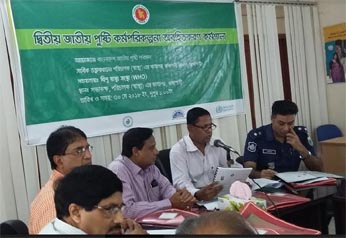RAJSHAHI, May 31, 2018 (BSS) – Collective efforts of all government and
non-government entities concerned has become indispensable for successful
implementation of the new nutrition action plan to combat malnutrition.
Facing severe problems of malnutrition, particularly in children,
Bangladesh has rolled out a new action plan to combat the menace.
The view was expressed at a divisional advocacy workshop by some health
experts. They urged all the stakeholders to discharge their duties with
utmost sincerity and honesty so that the plan of action is implemented
properly.
Bangladesh National Nutrition Council (BNNC) and Divisional Directorate of
Health (DDH) jointly organized the workshop titled “Second Bangladesh
National Nutrition” at the office conference hall of DDH yesterday in
association with World Health Organization.
Additional Commissioner of Rajshahi division Aminul islam addressed the
workshop as chief guest with Dr Anisur Rahman, Divisional Director of Health,
in the chair.
Director of Rajshahi Medical College Hospital Brig Gen Jamilur Rahman,
Director of Shahid Ziaur Rahman Medical College Hospital, Bogura Brig Gen
Golam Rasul and Superintendent of Police Abdus Salam also spoke.
During his keynote presentation, Dr Mustafizur Rahman, Programme Manager of
BNNC, said some 36 percent children under-five are too short for their height
or stunted and 33 percent are underweight, according to latest study that
recommends strong multi-sectoral approach to break this cycle for a healthy
generation.
Keeping this in mind, BNNC approved the 2nd National Plan of Action on
Nutrition (NPAN) 2016-2025 recently.
Its goal is to improve the nutritional status of all citizens and reduce
all forms of malnutrition, with a focus on children, adolescent girls,
pregnant women and lactating mothers.
“It’s a multi-sectoral plan to improve overall nutrition situation of
Bangladesh,” said Dr Rahman, “It is developed in alignment with the recently
approved National Nutrition Policy.”
“The key stakeholders were involved in the development of the plan,” Dr
Rahman, told the meeting.
“This plan will guide different sectors/ministries of the government and
development partners to tailor their programmes that will help to improve
nutritional status of the people, especially women and children,” he said
about the public benefits of the plan.
The plan was the result of a robust national collaborative process and led
to the inclusion of nutrition in the individual ministries and other
stakeholders’ priorities.
It comprises sets of nutrition specific and sensitive public policies and
direct actions in an array of sectors including health, education,
agriculture, fisheries and livestock, environment, social protection, women
empowerment, and disaster management.
One of the key elements of the new plan is the enhanced monitoring
mechanism.
This plan is also a step towards reflecting Bangladesh’s commitment to
Sustainable Development Goals, Scaling up Nutrition, Second International
Conference on Nutrition and World Health Assembly.
On Apr 23, 1975, President Bangabandhu Sheikh Mujibur Rahman ordered the
formation of a Bangladesh National Nutrition Council.
A year after the Awami League came to power in 1996, the government made
the first national nutrition action plan.
Dr Rahman told the meeting that the Ministry of Health and Family Welfare
coordinated the formulation of the second plan with support from World Health
Organisation Bangladesh Country Office, among others.



